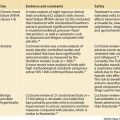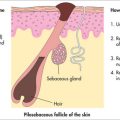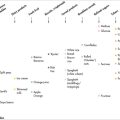chapter 2 Evidence-based healthcare
POTENTIAL AND LIMITATIONS OF EBM
Some particular limitations of EBM in the general practice setting are summarised by Stephenson:2
LEVELS OF EVIDENCE
EBM reviews sometimes provide challenging findings. For example, a meta-analysis published in The Lancet gave surprising results on the efficacy of homeopathy, finding that the odds ratio for positive trial results was 2.45 in favour of homeopathy.3 Though more high-quality RCTs are required, either homeopathy is clinically effective for a range of conditions or there is a publication bias in favour of homeopathy. Thus, even with ‘level 1 evidence’ a clinician still needs to interpret the findings and decide what to make of them.
Patients and the general public are often not aware of levels of evidence, and nor can they easily interpret evidence for themselves. Furthermore, they can be significantly affected by misleading marketing. The GP therefore has a vitally important role in helping people to:
A SYSTEMATIC APPROACH TO EVIDENCE
Exploring a clinical question or decision for oneself can be very informative and excellent practice in critical thinking. Box 2.1 gives an outline of a systematic approach to exploring an issue through EBM.
| Step 1 | Identify the need for information to inform a decision and then frame the question. |
| Step 2 | Find the best evidence to answer the question. |
| Step 3 | Critically appraise the evidence for validity (is it true), impact (effect size) and applicability (relevance to your practice). |
| Step 4 | Integrate the results of the appraisal with your clinical judgment, the circumstances and the patient’s values. |
| Step 5 | Evaluate your performance and reflect on ways to improve performance. |
(from Sackett et al4)
PUBLICATION BIAS
A clinician can only make decisions based on the quality of evidence or advice that is available. We generally trust that when we consult a medical database or the opinion of an expert body we will receive unbiased and objective information. Unfortunately, this is often not the case. All evidence is not equal.
Retail spending on prescription drugs in the USA climbed from $US78.9 billion to $US154.5 billion between 1997 and 2001.5 With such amounts at stake, market forces commonly influence research, publication and the interpretation of research data. Thus, even with the best intentions, the basis upon which clinicians make decisions will often be biased as a result. For example, pharmaceutical companies have an interest in promoting antidepressant prescribing. Not only is it advantageous to increase the potential market—for example, prescribing for younger patients—but it is also advantageous to lower the threshold for prescribing. However, although most of the antidepressant trials published show a positive effect, in many of these trials the data have been interpreted in a way that makes the findings look more positive than they really are, and almost none of the negative trials are published.6 The actual effect size of antidepressants is more than 30% lower than published trials would have one believe. A fuller analysis of both the published and the unpublished data suggests that antidepressants actually have no more than a placebo effect for mild to moderate depression and only a marginal effect for severe depression,7 with approximately 80% of the clinical effect being attributable to the placebo response.8 Concerns about the effect of publication bias on other medication categories such as chemotherapy also exist.9
For systematic reviews to be meaningful, there needs to be an assessment of all trials, positive and negative, and complete honesty and transparency about findings. Although we like to think that drugs which make it to market have been intensively scrutinised, researchers from the University of California, San Francisco, found troubling evidence of suppression and manipulation of data in studies published in (or often withheld from) peer-reviewed medical journals.10 They compared the information that companies shared with the USA’s Food and Drug Administration (FDA) about those drugs on application for approval to market, with what was eventually published in medical journals. Only three-quarters of the original trials were ever published, and those with positive outcomes were nearly five times as likely to be published as those that were negative. There may be many reasons for this—commercial reasons for the pharmaceutical companies, professional or academic issues for the researchers who want to be associated with a ‘successful’ drug development, decisions by the editors of peer-reviewed journals who may feel that positive results make better reading and give them headlines in the mainstream press.
MEDICAL PRACTICE, MARKETING AND EBM
The entanglement of clinical medicine with the pharmaceutical industry is widespread and has almost infinite potential to influence practice.11 Many expert bodies that determine therapeutic guidelines have multiple members with conflicts of interest due to their association with pharmaceutical companies. Sponsors of medical educational seminars and conferences are also known to influence the speaker list and content. Many of the medical stories promoted by the media are industry-driven, although this is rarely transparent to consumers or doctors.12 Transparency is therefore a vital part of a doctor’s ability to make an informed decision about how much weight to give to a particular guideline or opinion.
‘THERE IS NO EVIDENCE’
RESOURCES
Databases and websites with information specifically on CAM
Alternative and Complementary Medicine Centre, www.healthy.net/clinic/therapy/index.asp
Alternative and Complementary Therapies, http://www.liebertpub.com/act (a Medline-listed journal)
Alternative Medicine Foundation, HerbMed, http://www.herbmed.org (valuable information about herbs and drug–herb interactions)
National Cancer Institute, http://www.cancer.gov/cancertopics/factsheet/therapy/CAM (US site with useful oncology information)
NHS Evidence, http://www.library.nhs.uk/cam/ (comprehensive and easy to use, with good links)
National Institutes of Health, National Center for CAM, http://www.nccam.nih.gov/health/
Research Council for Complementary Medicine, http://www.rccm.org.uk/cameol/Default.aspx (excellent source of information and easy to navigate)
1 Linthorst G, Daniels J, Van Westerloo D. The majority of bold statements expressed during grand rounds lack scientific merit. Med Educ. 2007;41(10):965-967. a p 965.
2 Stephenson A. A textbook of general practice. 2nd edn. London: Arnold, 2004.
3 Linde K, Clausius N, Ramirez G, et al. Are the clinical effects of homeopathy placebo effects? A meta-analysis of placebo controlled trials. Lancet. 1997;350(9081):834-843.
4 Sackett D, Straus S, Richardson W, et al. Evidence-based medicine: how to practise and teach EBM. 2nd edn. Edinburgh: Churchill Livingstone, 2000.
5 National Institute for Health Care Management Research and Educational Foundation. Report on drug prices. 2002:2. Online. Available: http://www.nihcm.org/spending2001.pdf.
6 Turner EH, Matthews AM, Linardatos E, et al. Selective publication of antidepressant trials and its influence on apparent efficacy. N Engl J Med. 2008;358(3):252-260.
7 Kirsch I, Deacon BJ, Huedo-Medina TB, et al. Initial severity and antidepressant benefits: a meta-analysis of data submitted to the Food and Drug Administration. PLoS Medicine. 2008;5(2):e45. 10.1371/journal.pmed.0050045.
8 Kirsch I, Moore TJ, Scoboria A, et al. The emperor’s new drugs: an analysis of antidepressant medication data submitted to the US Food and Drug Administration. 2002; Prev Treat 5 article 23. Online. Available: http://journals.apa.org/prevention/volume5/pre0050023a.html.
9 Peppercorn J, Blood E, Winer E, et al. Association between pharmaceutical involvement and outcomes in breast cancer clinical trials. Cancer. 2007;109(7):1239-1246.
10 Rising K, Bacchetti P, Bero L. Reporting bias in drug trials submitted to the food and drug administration: review of publication and presentation. PLoS. 2008;5(11):e217. 10.1371/journal.pmed.0050217. Online. Available: http://medicine.plosjournals.org/perlserv/?request=get-document&doi=10.1371/journal.pmed.0050217&ct=1.
11 Moynihan R. Who pays for the pizza? Redefining the relationships between doctors and drug companies. 1: Entanglement. BMJ. 2003;326(7400):1189-1192.
12 Moynihan R, Bero L, Ross-Degnan D, et al. Coverage by the news media of the benefits and risks of medications. N Engl J Med. 2000;342(22):1645-1650.
13 Thompson PL, Gilbert RE, Long PF, et al. Has UK guidance affected general practitioner antibiotic prescribing for otitis media in children? J Pub Health (Oxf). 2008;30(4):479-486.
14 MacLennan A, Green R, O’Shea R, et al. Routine hospital admission in twin pregnancy between 26 and 30 weeks gestation. Lancet. 1990;335(8684):267-269.
15 Andrews W, Leveno K, Sherman M, et al. Elective hositalisation in the management of twin pregnancy. Obstet Gynecol. 1991;77(6):826-831.
16 Nutton RW. Is arthroscopic surgery a beneficial treatment for knee osteoarthritis? Nat Clin Pract Rheumatol. 2009;5(3):122-123.
17 Morgan G, Ward R, Barton M. The contribution of cytotoxic chemotherapy to 5-year survival in adult malignancies. Clin Oncol. 2005;16(8):549-560.






